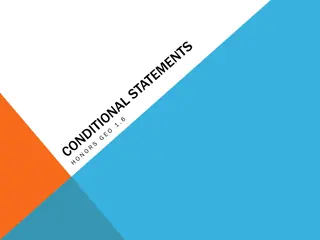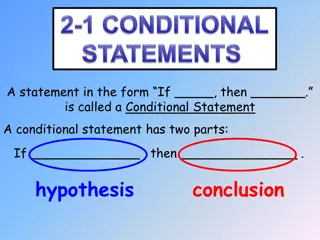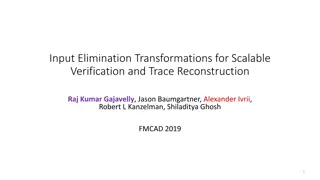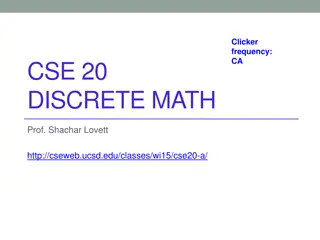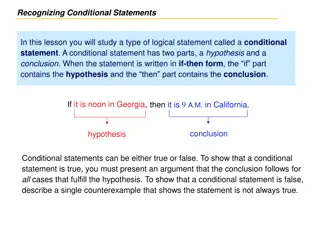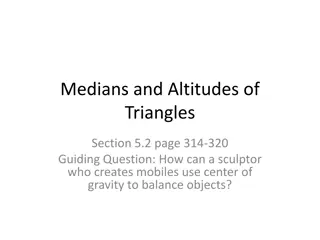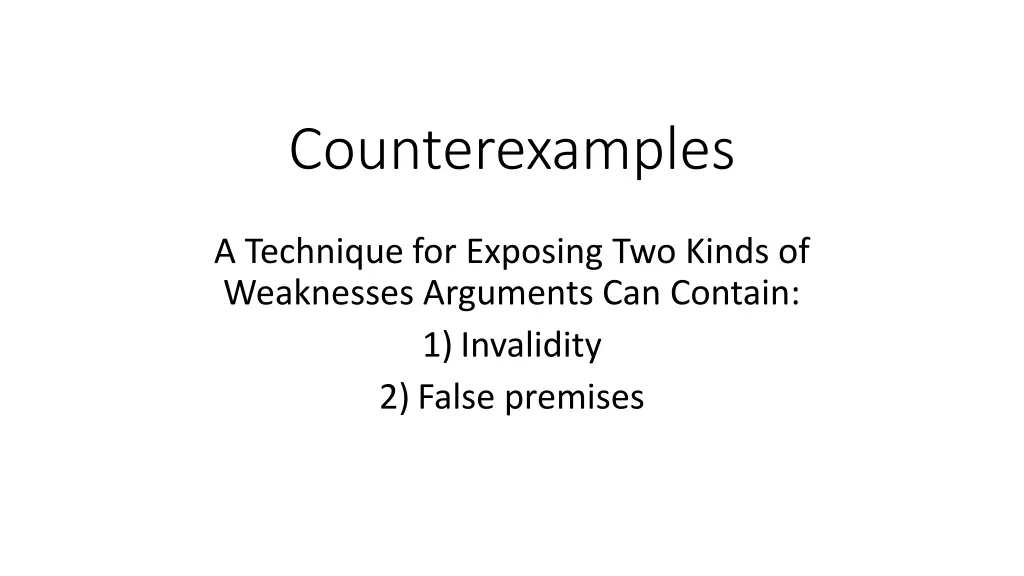
Exposing Weaknesses in Generalizations through Counterexamples
Learn how counterexamples can reveal weaknesses in different types of arguments, including non-moral and moral generalizations. Understand the techniques for challenging claims and exploring exceptions to established rules.
Download Presentation

Please find below an Image/Link to download the presentation.
The content on the website is provided AS IS for your information and personal use only. It may not be sold, licensed, or shared on other websites without obtaining consent from the author. If you encounter any issues during the download, it is possible that the publisher has removed the file from their server.
You are allowed to download the files provided on this website for personal or commercial use, subject to the condition that they are used lawfully. All files are the property of their respective owners.
The content on the website is provided AS IS for your information and personal use only. It may not be sold, licensed, or shared on other websites without obtaining consent from the author.
E N D
Presentation Transcript
Counterexamples A Technique for Exposing Two Kinds of Weaknesses Arguments Can Contain: 1)Invalidity 2)False premises
1.1 Non 1.1 Non- -Moral Generalizations and the Technique of Moral Generalizations and the Technique of Counterexamples Counterexamples Consider two simple kinds of non-moral generalizations 1. Anything that has property P ALWAYS has property Q as well 2. Something that has property P NEVER has property Q What if you think #1 is false? How could you demonstrate its falsity? With a counterexample, of course! But, what would provide a counterexample to the claim that anything with property P always has property Q? _____________________________________________________
Hint: this is just like finding a counterexample to the claim All swans are white.
What counterexample would serve to establish that #2 (That something that has property P never has property Q) is false? ________________________________________
Hint: this is just like finding a counterexample to the claim No swans are white.
1.2 Moral Claims and the Technique of Counterexamples Moral generalizations can be challenged by counterexamples in very much the same way non- moral generalizations can be. There are, however, some special considerations that arise when the technique of counterexamples is applied to moral claims, and they need to be kept clearly in mind.
These involve: (1) The distinction between absolute moral rules, and prima facie rules; (2) The idea of doomsday-style counterexamples; (3) The value of counterexamples that are not of the doomsday variety; (4) The use of purely imaginary cases; (5) Counterexamples and rights claims; (6) The scope of the method of counterexamples; (7) The reason why the method is so often fruitful; (8) Searching for the most effective counterexamples.
1.2.1 Absolute Moral Rules vs. 1.2.1 Absolute Moral Rules vs. Prima Facie Moral Rules Prima Facie Moral Rules Moral statements can be interpreted in two very different ways. Consider the claim Adultery is always morally wrong. This can mean: (1) Adultery is always wrong, all things considered, regardless of the circumstances, and regardless of the consequences. But it can also mean: (2) Adultery is always prima facie wrong; it is always wrong in itself; it is always wrong other things being equal. How do these two ways of understanding Adultery is always morally wrong differ?
(1) Adultery is always wrong, all things considered, regardless of the circumstances, and regardless of the consequences is an Absolute Moral Rule Absolute Moral Rule (2) Adultery is always prima facie wrong; it is always wrong in itself; it is always wrong other things being equal is a Prima Facie Moral Rule Prima Facie Moral Rule The difference between these two rules can be captured by considering Mary s situation. Suppose that Mary is in a rather odd situation, in which the only way in which she can save the life of some innocent person is by committing adultery. Someone who maintains that adultery is prima facie wrong might say that, although adultery was always wrong in itself, nonetheless Mary should commit adultery in order to save the life of the innocent person. In contrast, someone who held that adultery was always wrong, all things considered, regardless of the circumstances and regardless of the consequences, would say that Mary should not commit adultery, even though an innocent person will die if she doesn't.
One important consequence of the difference One important consequence of the difference between Absolute and Prima Facie Moral Rules between Absolute and Prima Facie Moral Rules It is much harder to come up with a counterexample challenging a Prima Facie Moral Rule than to come up with one challenging an Absolute Moral Rule. Why? Because prima facie rules allow for consideration of competing moral considerations, whereas absolute moral rules do not. Since adultery is always wrong, regardless of circumstances (on the absolute version of the rule), Mary has to avoid adultery and accept the consequence that an innocent person dies. This is easily defeated by counterexample. Consider the following scenario: An evil genius has arranged for the earth to explode unless and until Mary saves the life of the innocent child by committing adultery.
In this case, it seems clear what Marys moral obligation is, and that obligation directly undermines the absolute version of the moral rule. This is known as a Doomsday Counterexample and all absolute moral rules are vulnerable to this kind of challenge.
Why is it hard to create counterexamples to Prima Facie Moral Rules? Precisely because they acknowledge that there could be competing moral considerations that have greater weight than those that support the prima facie moral rule being challenged.
One way to see how this works is to consider that because prima facie moral rules only declare that the wrongfulness of the action is wrong when taken by itself. They do not declare that this action is wrong in all possible circumstances. This means that a prima facie moral rule implies that there are both wrong-making and right-making features of actions, and that in any particular situation, what makes an action wrong- making (it is in itself wrong) can be outweighed by something in the situation that is right-making.
Consider the case of the householder who is harboring a Jewish family in their basement during the Nazi regime s successful genocidal campaign against all Jews. Let us suppose that this householder thinks that lying is prima facie wrong, and that we agree that this principle applies across the board in all cases of lying. Nonetheless, it seems that when the householder lies to the SS officers who ask Are you harboring Jews in your home? and says, By no means, sirs, we do not think that the householder has done anything wrong, but rather, done something entirely right.
Why is this? Because the wrong-making feature of the action (misleading others about the truth by lying) is outweighed by the right-making feature of the action (saving innocent persons from violence and death).
Practicing Counterexample Challenges to Practicing Counterexample Challenges to Prima Facie Moral Claims Prima Facie Moral Claims 1. Adultery is always prima facie wrong. 2. It is always prima facie wrong to kill someone who wants to live. 3. Breaking the law is always (at least) prima facie wrong. 4. Divorce is always prima facie wrong 5. Pleasurable experiences are always prima facie good.
Some hints about how to challenge Some hints about how to challenge prima facie claims 1 prima facie claims 1- -5. 5. For claim 1: Try thinking about harm, deception, and breaking promises. For claim 2: Think about someone who is, or has been, very naughty. For claim 3: Don't confine yourself just to laws that exist at the present time. Consider laws that existed at earlier times, both in this country and in other countries. For claim 4: Try thinking about divorce and the idea of harm. For claim 5: Can you think of any pleasures that do not make the world a better place?


